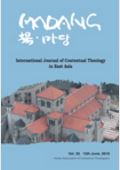Christian Spiritual Education:
- 한국민중신학회
- Madang: Journal of Contextual Theology
- 제29권
-
2018.06109 - 138 (30 pages)
- 18

Korean churches and Christians living in the 21st century experience confusion and crisis in the context of globalization with neo-liberalism, the Fourth Industrial Revolution, postmodernism, terrorism, and the emergence of new technology. Korean churches and Christians are concerned with the disintegration of authority and the tradition of postmodernism in the 21st century, the gap between rich and poor under the system of neo-liberalism, new issues of radical development of the Fourth Industrial Revolution, and global violence connected with religion, such as ISIS terrorism. Most Christians experience confusion when we look at these situations. Is there hope for us? Is the progress of technology pursued by humans reliable? What is the true subjectivity and meaning of human existence in a world where absoluteness and authority are dismantled and diversity is fragmented? In these global situations, what should Christianity and its followers pursue? Which destinations and ways of life should we pursue? Nevertheless, Christians should not be angry or despair when thinking about the world; instead, this should be a sign of hope to understand and change the world for the better through the Word of God and the wisdom of the Holy Spirit. Holistic Christian spiritual education does not separate God and the world, man from man, man from society, or man from nature. In this regard, I suggest five dimensions for becoming a better Christian (for a holistic Christian life) in the present.: (1) God the theological dimension; (2) man, the personal dimension; (3) the socio-cultural dimension; (4) the ecological environment; (5) and technology, related to the civilizational dimension. Holistic Christian spiritual education is focused on understanding all life and nature as an individual and is aimed at the life of Shalom, pursuing peace
Ⅰ. Introduction
II. Bible Study, Christian Education, Christian Spiritual Educa
III. Issues on ‘Holistic’ and ‘Spirituality’ and ‘Christian Spiritual Education’
IV. Core Values of Christian Spiritual Education
V. Conclusion
BIBLIOGRAPHY
(0)
(0)